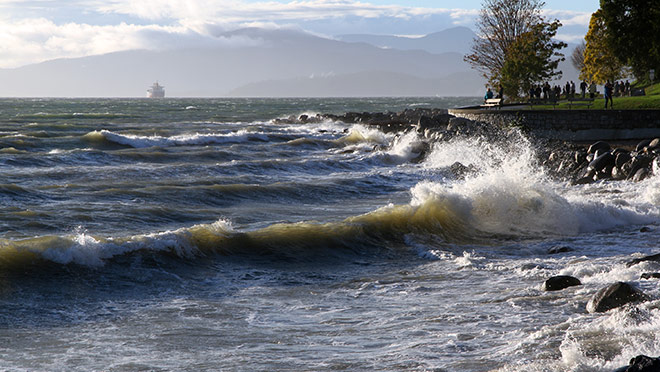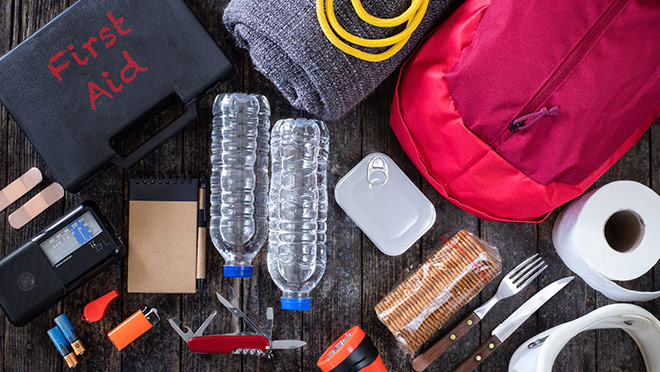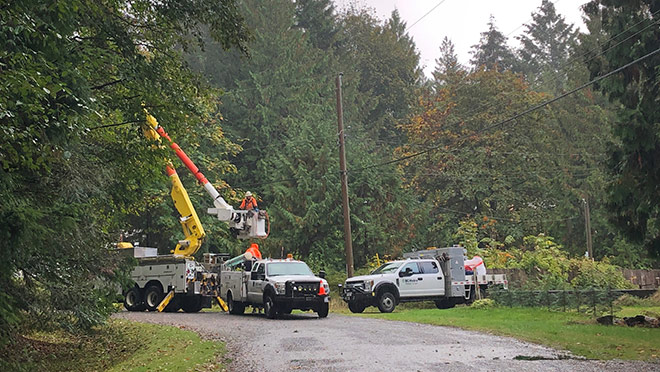Food, water, flashlight? Are you prepped for a power outage?

Check your supplies, and know how to stay safe during storm season
There's a good chance that the food in your fridge and freezer will be enough to get you through a power outage, as electricity is usually restored quickly in B.C. But there are exceptions, so be prepared for longer outages, and take the time to ensure that all members of your family are aware of what to do to be prepared for a power outage and stay safe in the aftermath of a damaging storm.
Does everyone in your home know where to find flashlights, a first aid kit, and other emergency supplies? Do they know to always assume that a fallen power line is live, even if it's not sparking, smoking or making a buzzing sound? Do they know to stay back at least 10 metres (about the length of a bus) from a downed power line and to call 911 to report it?
Being prepared, and aware of how to stay safe, is critical during storm season. It's also a good time to get you and your family prepared for other types of emergencies, such as a major earthquake.
Enter to win an emergency kit and battery pack
This month, we want to help you get prepared for a power outage. Find us on Instagram, Facebook, and Twitter for your chance to win one of nine prize packs, including a fully stocked emergency kit and external battery pack. Read the contest rules [PDF, 150 KB].

You've got questions, we've got answers
Below are answers to a variety of questions we get from customers each year. We recommend taking a few minutes to review them with your family.
How can I prepare for a power outage?
Buy or put together an emergency kit that includes a flashlight, extra batteries, a first aid kit, water and food. And if you already have a kit, check the best before dates on any food items in the mix, restock any items that you may have used, and ensure batteries are working.
Keep your smartphone charged, especially if the weather calls for a potential storm. Consider buying a portable external battery pack, as there are many good choices available for less than $100 that can provide two or more recharges for your device. With your phone, you'll be able to stay in touch with friends and family, and check bchydro.com/outages for outage updates and other valuable information.
What should I do during an extended power outage?
It's difficult to predict how much damage a storm will cause and how long a power outage will last. That's why we encourage everyone to be prepared for an outage that lasts more than a few hours, or even several days.
We recommend that you should:
- Have a fully stocked emergency kit that not only includes basics such as a flashlight, extra batteries, first aid kit, water and food, but also required medications, personal hygiene products, and some cash (in small bills) that can be used in an emergency. As earthquakes are a threat in much of B.C., it's a good idea to build a kit that can keep you going for at least 72 hours.
- Have a plan: check-in regularly with a friend or family member, also consider having regular check-ins with neighbours.
- Practice food safety: A freezer that is fully packed will hold food safely for 48 hours. A freezer that is half full will hold food safely for up to 24 hours.
- Use generators safely: home generators can be useful during an extended power outage, but they can also be very dangerous if they're not used properly. Never use a portable generator, outdoor or charcoal barbecues indoors, and don't store fuel indoors.
If your power goes out, we also recommend turning off any electronics and appliances that may have been running, as well as all lights, except for one (preferably an exterior light). This will reduce the strain on our system when power is restored, and the one light will help you and our crews know when power is back.
Why am I being asked to report a power outage?
While smart meters provide real-time outage notifications, they can't tell us what caused the outage. That's why we encourage you to call in if you have information about what caused the outage or the type of damage.
For example, if you can tell us you heard a loud bang or saw a flash, it helps us ensure we send the right number of people with the right type of equipment to respond, speeding up the restoration process.
What should I do with the food in my refrigerator?
Keep the doors to your fridge and freezer closed as much as possible. Consider making a full list of everything in your freezer so that you don't have to repeatedly open it and allow cold air to escape.
Eat items in your fridge first – if the power's out for less than four hours, the food will be safe to eat during that period. A freezer that's fully packed will hold food safely for up to 48 hours, while a freezer that's half full will hold food safely for up to 24 hours. If you're unsure about the safety of your food, we recommend contacting the local health authority.
Learn about safe food storage at HealthLinkBC.
Did you know? When your freezer isn't full, make it more efficient by filling with water and freezing (to three quarters for expansion) carefully cleaned two-litre plastic pop bottles. In an outage, they'll help keep your freezer or fridge colder longer, and when the ice thaws, you'll have drinking water.
How are BC Hydro crews adjusting to the COVID-19 pandemic?
We've taken steps to ensure the health and safety of our crews and contractors, and the communities they work in. We now have crews working in small groups (or 'pods'), and in most cases, we're requiring that crews return home each night. We're cleaning trucks, sanitizing tools daily and ensuring employees reporting for work are healthy and symptom free.
Due to our enhanced health and safety protocols, we could have fewer crews available to make repairs and restore power at the peak of cold and flu season. This could result in slower response times than our customers are used to.
Learn more about what you can expect from our crews during the novel coronavirus pandemic.
How does BC Hydro decide which outages to respond to first during a major storm?
Safety is always our first priority. We'll continue to work to repair any issues that present an immediate danger to health and safety. From there, it's a matter of getting the most customers back on as quickly as possible.
We do this by:
- Repairing high-voltage transmission lines and substations. Transmission lines, unlike the distribution lines in your neighbourhood or on your street, serve large numbers of customers. Damage to a transmission line or substation equipment can affect tens of thousands of people, instead of a few hundred.
- Working with municipalities and emergency responders to get power back to critical services, such as hospitals, fire stations, and municipal water systems.
- Restoring outages affecting a large neighbourhood, then smaller neighbourhoods, and finally, outages affecting individual customers or small pockets of five customers or fewer. That can mean that "newer" outages that affect much larger numbers of people may get tackled before an "older" outage in a smaller neighbourhood.
During an outage, why can't I see BC Hydro crews in my neighbourhood?
If you can't see us, it doesn't mean we're not working on the problem. Distribution lines from local substations are often located a distance from your home. A tree down four or five blocks away could be causing your outage.
If your power is out due to a problem on a transmission line or at a substation, it can be several kilometres away.
Why does the power sometimes come back on, then go out again a short time later?
In some areas, we're able to switch customers to another circuit temporarily to start providing power again while crews work. It makes outages shorter and gets the lights back on while we fix and replace equipment.
To complete the switching process, we sometimes need to take a short outage to allow crews to do their work. For you, this might look like your power coming back, only to go out again shortly after. Always stay clear of all fallen power lines, as power could come back on at any time.
